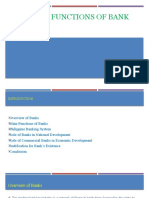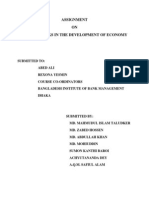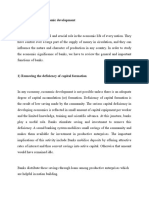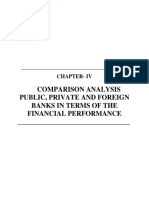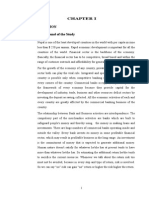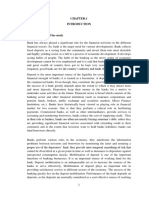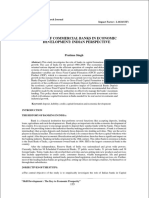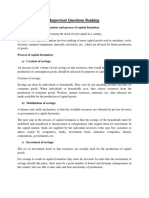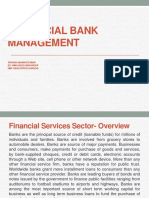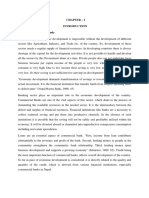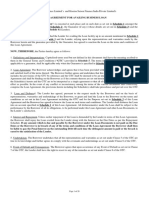(MBA 3 Smaster) : Subject
(MBA 3 Smaster) : Subject
Uploaded by
aleemjerryCopyright:
Available Formats
(MBA 3 Smaster) : Subject
(MBA 3 Smaster) : Subject
Uploaded by
aleemjerryOriginal Description:
Original Title
Copyright
Available Formats
Share this document
Did you find this document useful?
Is this content inappropriate?
Copyright:
Available Formats
(MBA 3 Smaster) : Subject
(MBA 3 Smaster) : Subject
Uploaded by
aleemjerryCopyright:
Available Formats
1
SUBJECT: Banking Laws and Practices Assignment # 1 SUBMITTED TO: PROF. Khalil Rao SUBMITTED BY: M.Qasim zafar M. Aleem Ashraf Rana Ali Hamza
(MBA 3rd SMASTER)
FINANCIAL INSTITUTIONS
INTRODUCTION:
A financial institution is any organization in the business of moving, investing or lending money, dealing in financial instruments or providing financial services. Banking section plays important role in national & international business. Includes commercial banks, federal and state savings banks, savings and loan associations and credit unions. Refers to any bank, credit unions or other entity that distribute cash. Banking section plays important role in national & international business.
INTERMEDIARIES:
Most of the people do not enter financial markets directly but use intermediaries or middlemen. Commercial banks are the financial intermediary we meet most often in macroeconomics, but mutual funds, pension funds, credit unions, savings and loan associations, and to some extent insurance companies are also important financial intermediaries. A person who has extra money could, of course, seek out borrowers himself and bypass the intermediary.
DIFFERENT FINANCIAL INSTITUTIONS IN PAKISTAN:
Sr#
Name of Bank
NATIONALIZED COMMERCIAL BANKS 1 2 3 4
First Women Bank Ltd Habib Bank Limited National Bank of Pakistan United Bank Limited
DE-NATIONALIZED BANKS
5 6
Allied Bank of Pakistan Ltd Muslim Commercial Bank Ltd
SPECIALIZED SCHEDULED BANKS
7 8 9 10
Agricultural Development Bank of Pakistan Federal Bank for Co-operatives Industrial Development Bank of Pakistan Punjab Provincial Co-operative Bank Ltd
PRIVATE SCHEDULED BANKS
11 12 13
Askari Commercial Bank Ltd Bank Alfalah Limited Bank Al-Habib Limited
14 15 16 17 18 19 20 22 23
Bolan Bank Limited Faysal Bank Limited Meezan Bank Limited Metropolitan Bank Limited PICIC Commercial Bank Ltd Platinum Commercial Bank Ltd Prime Commercial Bank Ltd Soneri Bank Limited Union Bank Limited
PROVINCIAL BANKS
24 25
The Bank of Khyber The Bank of Punjab
MICRO FINANCE BANKS
27
The First Micro Finance Bank Limited
DEVELOPMENT FINANCIAL INSTITUTIONS
28 29. 30 31. 32.
Investment Corporation of Pakistan National Investment Trust Limited Pak Kuwait Investment Company(Pvt) Limited Pak Libya Holding Company (Pvt) Limited Pak Oman Investment Company (Pvt) Limited
33. 34. 35.
Pakistan Industrial Credit & Investment Corp. Ltd. Saudi Pak Industrial & Agricultural Investment Company (Pvt) Limited SME Bank Limited
INVESTMENT BANKS
36. 37. 38. 39. 40. 41. 42. 43. 44. 45. 46. 47. 48. 49. `
First Standard Investment Bank Limited Asset Investment Bank Limited Atlas Investment Bank Limited Crescent Investment Bank Limited Escorts Investment Bank Limited Fidelity Investment Bank Limited First International Investment Bank Limited Franklin Investment Bank Limited Islamic Investment Bank Limited Jehangir Siddiqui Investment Bank Limited Orix Investment Bank (Pak) Limited Prudential Investment Bank Limited Security Investment Bank Limited Trust Investment Bank Limited
The Role of Financial Institutions in Trade & Business
Financial institutions play an important and active role in the economic growth and development of a country. If the Financial institution system in a country is effective, efficient and disciplined it brings about a rapid growth in the various sectors of the economy. The following is the significance of financial institutions in the economic development of a country. 1. Banks promote capital formation 2. Investment in new enterprises 3. Promotion of trade and industry 4. Development of agriculture 5. Balanced development of different regions 6. Influencing economy activity 7. Implementation of Monetary policy 8. Monetization of the economy 9. Export promotion cells
1. Banks promote capital formation:
Commercial banks accept deposits from individuals and businesses, these deposits are then made available to the businesses which make use of them for productive purposes in the country. The banks are, therefore, not only the store houses of the countrys wealth, but also provide financial resources necessary for economic development.
2. Investment in new enterprises:
Businessmen normally hesitate to invest their money in risky enterprises. The commercial banks generally provide short and medium term loans to entrepreneurs to invest in new enterprises and adopt new methods of production. The provision of timely credit increases the productive capacity of the economy.
3. Promotion of trade and industry:
With the growth of commercial banking, there is vast expansion in trade and industry. The use of bank draft, check, bill of exchange, credit cards and letters of credit etc has revolutionized both national and international trade.
4. Development of agriculture:
The commercial banks particularly in developing countries are now providing credit for development of agriculture and small scale industries in rural areas. The provision of credit to agriculture sector has greatly helped in raising agriculture productivity and income of the farmers.
5. Balanced development of different regions:
The commercial banks play an important role in achieving balanced development in different regions of the country. They help in transferring surplus capital from developed regions to the less developed regions.
The traders, industrialist etc of less developed regions is able to get adequate capital for meeting their business needs. This in turn increases investment, trade and production in the economy.
6. Influencing economic activity:
The banks can also influence the economic activity of the country through its influence on a. Availability of credit b. The rate of interest If the commercial banks are able to increase the amount of money in circulation through credit creation or by lowering the rate of interest, it directly affects economic development. A low rate of interest can encourage investment.
7. Implementation of Monetary policy:
The central bank of the country controls and regulates volume of credit through the active cooperation of the banking system in the country. It helps in bringing price stability and promotes economic growth with in the shortest possible period of time.
8. Monetization of the economy:
The commercial banks by opening branches in the rural and backward areas are reducing the exchange of goods through barter. The use of money has greatly increased the volume of production of goods. The non monetized sector (barter economy) is now being converted into monetized sector with the help of commercial banks.
Role of Banks in 21st century
The commercial banks are now not confined to local banking. They are fast changing into global banking i.e., understanding the global customer, using latest information technology, competing in the open market with high technology system, changing from domestic banking to investment banking etc.
The commercial bank is now considered the nerve system of all economic
development in the country.
Financial Institutions
Savings
Growth
Business Investment
Under this scenario the financial institutions in an economy creates an opportunity. In this model the financial institutions leads to the official savings rates, which in turn lead to business investment, further growing the economy and resulting in a high level of financial institutions.
You might also like
- An Economic History of The United States Connecting The Present With The Past (Mark v. Siegler)Document496 pagesAn Economic History of The United States Connecting The Present With The Past (Mark v. Siegler)Arun Rajbhandari100% (2)
- Role of Commercial Banks in The Economic Development of PakistanDocument2 pagesRole of Commercial Banks in The Economic Development of Pakistanasmi100% (2)
- Economic Functions of BankPPTDocument23 pagesEconomic Functions of BankPPTKeith Brandon AlanaNo ratings yet
- EconomicsDocument15 pagesEconomicsPrachi PhulkeshwarNo ratings yet
- Role of Commercial Banks in Financing SmallDocument19 pagesRole of Commercial Banks in Financing SmallGowtham RaajNo ratings yet
- Commercial Banks' Role in The Economic DevelopmentDocument19 pagesCommercial Banks' Role in The Economic Developmentprasanthmct100% (2)
- Commercial BankingDocument5 pagesCommercial BankingJasleen kaurNo ratings yet
- Finance UbiDocument36 pagesFinance UbiRanjeet RajputNo ratings yet
- Role of Banks in The Development of EconomyDocument25 pagesRole of Banks in The Development of EconomyZabed HossenNo ratings yet
- Principles of Sound LendingDocument13 pagesPrinciples of Sound LendingGusuu GalataaNo ratings yet
- Money&Banking Pakistan RelatedDocument7 pagesMoney&Banking Pakistan RelatedYaseen ArmanNo ratings yet
- Merchant Banking in IndiaDocument14 pagesMerchant Banking in IndiaMohitraheja007No ratings yet
- Executive SummaryDocument36 pagesExecutive SummarySuchitaSalviNo ratings yet
- Role of Banks in Economic DevelopmentDocument11 pagesRole of Banks in Economic Developmentakashscribd01100% (5)
- Role of Banking in Eco DevelopmentDocument4 pagesRole of Banking in Eco DevelopmentmanikaNo ratings yet
- Final Merchant Banking ProjectDocument81 pagesFinal Merchant Banking Projectlove_3No ratings yet
- Conclusion and RecommendationsDocument3 pagesConclusion and Recommendationsstore_2043370333% (3)
- Management of Non-Performing Assets and ImplicationsDocument43 pagesManagement of Non-Performing Assets and ImplicationsManisha SinghNo ratings yet
- Indian Bank Home LoanDocument60 pagesIndian Bank Home Loanriyazmaideen17No ratings yet
- Submitted To: Sk. Alamgir Hossain Lecturer Department of Finance Jagannath University, Dhaka-1100Document35 pagesSubmitted To: Sk. Alamgir Hossain Lecturer Department of Finance Jagannath University, Dhaka-1100Kazi AsaduzzmanNo ratings yet
- Unit 2 Banking Innovations: Evolution of Banking in IndiaDocument8 pagesUnit 2 Banking Innovations: Evolution of Banking in IndiaAnitha RNo ratings yet
- Mahindra FinanceDocument75 pagesMahindra FinanceRAHULNo ratings yet
- Rajsamand Urban Co-Operarive Bank - Project ReportDocument63 pagesRajsamand Urban Co-Operarive Bank - Project Reportanurag_santNo ratings yet
- HBL ReportDocument14 pagesHBL Reportvepir63341No ratings yet
- Rizwan TufailDocument40 pagesRizwan TufailTamurNo ratings yet
- 12 Chapter 4Document84 pages12 Chapter 4Ashok kumarNo ratings yet
- Zangi TestDocument20 pagesZangi TestEng Hinji RudgeNo ratings yet
- Philippine Financial SystemDocument20 pagesPhilippine Financial SystemMing SaliliNo ratings yet
- 4 - Philippine Financial SystemDocument23 pages4 - Philippine Financial Systemcrisnajamaica09302004No ratings yet
- Babita ThesisDocument104 pagesBabita Thesisniran_stock123No ratings yet
- Final Project of Banking and Financial MarketsDocument32 pagesFinal Project of Banking and Financial MarketsNaveed KhokharNo ratings yet
- BankDocument3 pagesBankAnkita GodhawatNo ratings yet
- ChapterDocument80 pagesChapterBright Future CIITNo ratings yet
- RitiDocument21 pagesRitiRiti NepaliaNo ratings yet
- Project ReportDocument55 pagesProject Reportshrestha mobile repringNo ratings yet
- ChapterDocument88 pagesChaptersahilbastola1No ratings yet
- Shanto-Mariam University of Creative Technology: Module Name: Shipping and Banking Module Code: AMM-4323Document16 pagesShanto-Mariam University of Creative Technology: Module Name: Shipping and Banking Module Code: AMM-4323Batch 27No ratings yet
- What Are The Objectives & Achievements of Bank Nationalization in India?Document32 pagesWhat Are The Objectives & Achievements of Bank Nationalization in India?rakesh4888No ratings yet
- Role of Commercial Banks in IndiaDocument6 pagesRole of Commercial Banks in Indiaakky.vns2004No ratings yet
- Role of Commercial Banks in Economic Development: Indian PerspectiveDocument6 pagesRole of Commercial Banks in Economic Development: Indian PerspectivekapuNo ratings yet
- Comparative Analysis of Public & Private Bank (Icici &sbi) - 1Document108 pagesComparative Analysis of Public & Private Bank (Icici &sbi) - 1Sami Zama100% (2)
- Bank ManagementDocument20 pagesBank Managementamirahhani najmaNo ratings yet
- Soft Copy of Project... 2Document21 pagesSoft Copy of Project... 2Jahid KhanNo ratings yet
- Important Questions BankingDocument21 pagesImportant Questions BankingAshutosh AgalNo ratings yet
- Group 2Document11 pagesGroup 2eranyigiNo ratings yet
- Tamilnad Mercantile Bank LimitedDocument60 pagesTamilnad Mercantile Bank LimitedRinkesh Agarwal100% (1)
- Pratima Pudasaini Thesis of Credit Management 7 1Document67 pagesPratima Pudasaini Thesis of Credit Management 7 1Pradipta KafleNo ratings yet
- Commercial BankDocument8 pagesCommercial BankNitesh Kotian100% (2)
- Banking: & Microfinace - IDocument8 pagesBanking: & Microfinace - IPayal hazraNo ratings yet
- Final Internship Report On Askari Bank..Document98 pagesFinal Internship Report On Askari Bank..Tahir MeoNo ratings yet
- Executive Summary Credit Management Can Be Defined As "Management of Loans andDocument100 pagesExecutive Summary Credit Management Can Be Defined As "Management of Loans andchowdary368No ratings yet
- NPADocument63 pagesNPAChandan VermaNo ratings yet
- Commercial BankingDocument28 pagesCommercial Bankingmuhammad haris aqeelNo ratings yet
- Assignment On Law & Practice of Banking: Group 14 Department of Finance Jagannath University, Dhaka 29/03/2015Document37 pagesAssignment On Law & Practice of Banking: Group 14 Department of Finance Jagannath University, Dhaka 29/03/2015Manal RizwanNo ratings yet
- Fixe ReportDocument50 pagesFixe Reportrehan mughalNo ratings yet
- Chapter - I 1.1 Background of The StudyDocument47 pagesChapter - I 1.1 Background of The StudyAakash AcharyaNo ratings yet
- Chapter # 1: 1. What Is Bank?Document47 pagesChapter # 1: 1. What Is Bank?Shahid MehmoodNo ratings yet
- Financial AnalysisiDocument122 pagesFinancial Analysisibishnu paudelNo ratings yet
- Ms. Meera Mody: Banking and Non-Banking InstitutionsDocument30 pagesMs. Meera Mody: Banking and Non-Banking InstitutionsVijay RupaparaNo ratings yet
- Cooperative Law HandoutsDocument12 pagesCooperative Law HandoutsAngelica Nicole TamayoNo ratings yet
- Study of The Insolvency and Bankruptcy Code 2016Document15 pagesStudy of The Insolvency and Bankruptcy Code 2016Devansh DoshiNo ratings yet
- Methods of Lending, MPBF, and RBI Guidelines: by Prof. Divya GuptaDocument11 pagesMethods of Lending, MPBF, and RBI Guidelines: by Prof. Divya GuptaSantosh RanaNo ratings yet
- M-KESHO AccountOpeningFormDocument4 pagesM-KESHO AccountOpeningFormabd456No ratings yet
- Medel vs. Court of AppealsDocument11 pagesMedel vs. Court of AppealsMary Villanueva100% (1)
- Practice-Test GenMath EntradaDocument32 pagesPractice-Test GenMath EntradaThea Iris EscanillaNo ratings yet
- Clerkship Full Mock 8 QsDocument13 pagesClerkship Full Mock 8 Qssaleha4514No ratings yet
- Me - Mathematics of Investment 2023Document2 pagesMe - Mathematics of Investment 2023Nyctos From MHMNo ratings yet
- Cost of CapitalDocument15 pagesCost of CapitalShainaNo ratings yet
- Cooperative Credit StructureDocument19 pagesCooperative Credit Structurekes7100% (2)
- Paper Vijay Mahajan IndiaDocument22 pagesPaper Vijay Mahajan Indiadnt_scribdNo ratings yet
- PFP Unit 1 Introduction To Financial PlanningDocument68 pagesPFP Unit 1 Introduction To Financial PlanningChirag PatilNo ratings yet
- Feasibility Assessment TemplateDocument28 pagesFeasibility Assessment TemplateAziz Khan Lodhi100% (1)
- Class 10 SST SP With Solution Set-10Document41 pagesClass 10 SST SP With Solution Set-10bala.rmd132No ratings yet
- Southport Minerals CombinedDocument20 pagesSouthport Minerals CombinedEshesh GuptaNo ratings yet
- FIN352 - Review Questions For Midterm ExamDocument23 pagesFIN352 - Review Questions For Midterm ExamChloe MillerNo ratings yet
- Lai 111954262Document29 pagesLai 111954262Allanoor KhiljiNo ratings yet
- Take Home Salary Calculator IndiaDocument15 pagesTake Home Salary Calculator IndiaJ MurugadasanNo ratings yet
- Section 34 of Arbitration ACTDocument28 pagesSection 34 of Arbitration ACTRamesh HadiyaNo ratings yet
- IAS121 Study Guide 2024Document16 pagesIAS121 Study Guide 2024skyebanks2020No ratings yet
- 4.bausparen SlideshareDocument14 pages4.bausparen SlideshareHưng NguyễnNo ratings yet
- Extension ExercisesDocument10 pagesExtension Exercisesjackie.chanNo ratings yet
- 4ef1c - HDT - Sebi - Sharemarket - 2020B1 @ PDFDocument21 pages4ef1c - HDT - Sebi - Sharemarket - 2020B1 @ PDFMohan DNo ratings yet
- 5 6109368301685572542Document40 pages5 6109368301685572542Harsha VardhanNo ratings yet
- Intercompany Loan AgreementDocument8 pagesIntercompany Loan AgreementKarthikNo ratings yet
- Contract of PartnershipDocument3 pagesContract of PartnershipLezama and Umadhay Law Office100% (1)
- Illustrations TVM 2024-25Document4 pagesIllustrations TVM 2024-25forum.somaiya24No ratings yet
- Positive Personal Obligation or Obligation To Do (See Art.1167) - Negative Personal Obligation or Obligation Not To Do (See Art.1168)Document5 pagesPositive Personal Obligation or Obligation To Do (See Art.1167) - Negative Personal Obligation or Obligation Not To Do (See Art.1168)Rodel Amante MedicoNo ratings yet
- Technocracy (Howard Scott - Science vs. Chaos) (1933) RDocument24 pagesTechnocracy (Howard Scott - Science vs. Chaos) (1933) RAnonymous yu09qxYCM100% (1)


